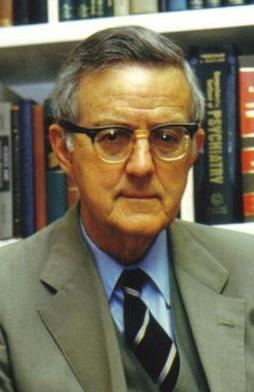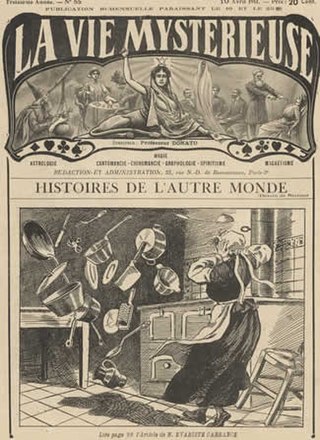Related Research Articles

Clairvoyance is the claimed ability to acquire information that would be considered impossible to get through scientifically proven sensations, thus classified as extrasensory perception, or "sixth sense". Any person who is claimed to have such ability is said to be a clairvoyant.
Extrasensory perception (ESP), also known as a sixth sense, or cryptaesthesia, is a claimed paranormal ability pertaining to reception of information not gained through the recognized physical senses, but sensed with the mind. The term was adopted by Duke University botanist J. B. Rhine to denote psychic abilities such as intuition, telepathy, psychometry, clairvoyance, clairaudience, clairsentience, empathy and their trans-temporal operation as precognition or retrocognition.

Parapsychology is the study of alleged psychic phenomena and other paranormal claims, for example, those related to near-death experiences, synchronicity, apparitional experiences, etc. Criticized as being a pseudoscience, the majority of mainstream scientists reject it. Parapsychology has also been criticized by mainstream critics for claims by many of its practitioners that their studies are plausible despite a lack of convincing evidence after more than a century of research for the existence of any psychic phenomena.

Telepathy is the purported vicarious transmission of information from one person's mind to another's without using any known human sensory channels or physical interaction. The term was first coined in 1882 by the classical scholar Frederic W. H. Myers, a founder of the Society for Psychical Research (SPR), and has remained more popular than the earlier expression thought-transference.
Precognition is the purported psychic phenomenon of seeing, or otherwise becoming directly aware of, events in the future.

An out-of-body experience is a phenomenon in which a person perceives the world as if from a location outside their physical body. An OBE is a form of autoscopy, although this term is more commonly used to refer to the pathological condition of seeing a second self, or doppelgänger.
Paranormal events are purported phenomena described in popular culture, folk, and other non-scientific bodies of knowledge, whose existence within these contexts is described as being beyond the scope of normal scientific understanding. Notable paranormal beliefs include those that pertain to extrasensory perception, spiritualism and the pseudosciences of ghost hunting, cryptozoology, and ufology.
Hindsight bias, also known as the knew-it-all-along phenomenon or creeping determinism, is the common tendency for people to perceive past events as having been more predictable than they were.

Ian Pretyman Stevenson was a Canadian-born American psychiatrist, the founder and director of the Division of Perceptual Studies at the University of Virginia School of Medicine. He was a professor at the University of Virginia School of Medicine for fifty years. He was chair of their department of psychiatry from 1957 to 1967, Carlson Professor of Psychiatry from 1967 to 2001, and Research Professor of Psychiatry from 2002 until his death in 2007.

Mediumship is the pseudoscientific practice of purportedly mediating communication between familiar spirits or spirits of the dead and living human beings. Practitioners are known as "mediums" or "spirit mediums". There are different types of mediumship or spirit channelling, including séance tables, trance, and ouija. The practice is associated with spiritualism and spiritism. A similar New Age practice is known as channeling.

Eusapia Palladino was an Italian Spiritualist physical medium. She claimed extraordinary powers such as the ability to levitate tables, communicate with the dead through her spirit guide John King, and to produce other supernatural phenomena.
Robert Lyle Morris was an American psychologist, parapsychologist and professor at the University of Edinburgh, where he was the first holder of the Koestler Chair of Parapsychology at the Koestler Parapsychology Unit.

The Moberly–Jourdain incident is a claim of time travel and hauntings made by Charlotte Anne Moberly (1846–1937) and Eleanor Jourdain (1863–1924).

Eleanor Frances Jourdain was an English academic, Principal of St Hugh's College, Oxford, 1915 to 1924. She died of a sudden heart attack after being forced to resign her post.

Telekinesis is a hypothetical psychic ability allowing an individual to influence a physical system without physical interaction. Experiments to prove the existence of telekinesis have historically been criticized for lack of proper controls and repeatability. There is no reliable evidence that telekinesis is a real phenomenon, and the topic is generally regarded as pseudoscience.
The curse of knowledge is a cognitive bias that occurs when an individual, who is communicating with others, assumes that others have information that is only available to themselves, assuming they all share a background and understanding. This bias is also called by some authors the curse of expertise.

Edith Maud Olivier MBE was an English writer, also noted for acting as hostess to a circle of well-known writers, artists, and composers in her native Wiltshire.

Francis Henry Everard Joseph Feilding best known as Everard Feilding was an English barrister, naval intelligence officer and psychical researcher.
According to some literary and religious studies scholars, modern Theosophy had a certain influence on contemporary literature, particularly in forms of genre fiction such as fantasy and science fiction. Researchers claim that Theosophy has significantly influenced the Irish literary renaissance of the late 19th and early 20th centuries, notably in such figures as W. B. Yeats and G. W. Russell.
References
- ↑ Fischhoff B (2003). "Hindsight not equal to foresight: the effect of outcome knowledge on judgment under uncertainty. 1975". Qual Saf Health Care. 12 (4): 304–11, discussion 311–2. doi:10.1136/qhc.12.4.304. PMC 1743746 . PMID 12897366.
- ↑ Dale, L. A., & White, R. A. (1977), or in other words someone gets knowledge about the past life of someone else without the known or ordinary sources but with some kind of power of the brain. It is also considered sixth sense by some people. Glossary of terms can be found in the literature of psychical research and parapsychology. In B. B. Wolman (Ed.), Handbook of Parapsychology (pp. 921–936). New York, NY, US: Van Nostrand Reinhold.
- ↑ Parapsychological Association (2007). Glossary of Parapsychological terms – Retrocognition Archived 2010-08-24 at the Wayback Machine
- ↑ Rhine, J. B. (1977). History of experimental studies. In B. B. Wolman (Ed.), Handbook of Parapsychology (pp. 25–47). New York, NY, US: Van Nostrand Reinhold.
- ↑ Sidgwick, E. M. (1911). [Review of An Adventure]. Proceedings of the Society for Psychical Research, 25.
- ↑ Iremonger, L. (1957). The ghosts of Versailles: Miss Moberly and Miss Jourdain and their Adventure: A critical study. London, UK: Faber & Faber.